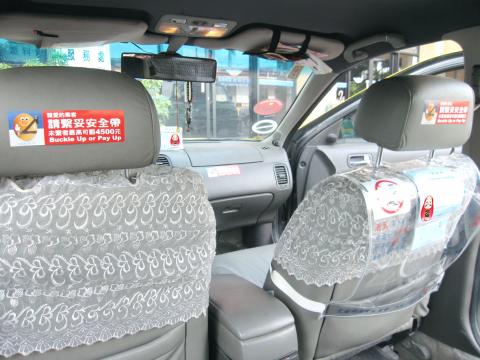The Directorate-General of Highways introduced a sticker yesterday that puts the onus on passengers sitting in back seats of taxis to fasten their seat belts or pay a fine.
According to a new law that took effect on Aug. 1, taxi drivers will be fined between NT$1,500 and NT$6,000 if their rear seat passengers are found not wearing seat belts and they were not informed before their ride of the necessity of using a seat belt.
There is a grace period — until Feb. 1 next year — before violators are penalized.

Photo: CNA, Directorate General of Highways
However, if passengers are informed by the driver to buckle up, but they decide not to, then the passengers would face a fine of NT$4,500, the agency said.
The new stickers, which read “Buckle Up or Pay Up,” were designed primarily to put the responsibility of wearing a seat belt when riding in taxis in the hands of the passenger.
The agency is recommending that taxi drivers adhere the stickers to the paneling facing the front passenger’s seat, as well as on the back of the front-seat headrests so they can be easily spotted.
By placing the stickers in those places, the drivers would meet their responsibility to inform the passengers of the law, the agency said.
The issue of wearing seat belts in the backseat gained national attention when Nora Sun (孫穗芬), a granddaughter of Republic of China founding father Sun Yat-sen (孫逸仙), was killed in a freeway car accident in January. She was not wearing a seat belt at the time of the crash.
Former Democratic Progressive Party lawmaker Chen Chao-lung (陳朝龍) first proposed the amendment to the Act Governing Punishments for Violations of Road Traffic Regulations (道路交通管理處罰條例) in 2006 after Shaw Hsiao-ling (邵曉鈴), the wife of Taichung Mayor Jason Hu (胡志強) was severly injured in a crash on a freeway near Tainan.
Shaw, who had not been wearing a seat belt, was thrown from a minivan, and lost her spleen and part of her left arm as a result of the accident.

Taiwanese can file complaints with the Tourism Administration to report travel agencies if their activities caused termination of a person’s citizenship, Mainland Affairs Council Minister Chiu Chui-cheng (邱垂正) said yesterday, after a podcaster highlighted a case in which a person’s citizenship was canceled for receiving a single-use Chinese passport to enter Russia. The council is aware of incidents in which people who signed up through Chinese travel agencies for tours of Russia were told they could obtain Russian visas and fast-track border clearance, Chiu told reporters on the sidelines of an event in Taipei. However, the travel agencies actually applied

New measures aimed at making Taiwan more attractive to foreign professionals came into effect this month, the National Development Council said yesterday. Among the changes, international students at Taiwanese universities would be able to work in Taiwan without a work permit in the two years after they graduate, explainer materials provided by the council said. In addition, foreign nationals who graduated from one of the world’s top 200 universities within the past five years can also apply for a two-year open work permit. Previously, those graduates would have needed to apply for a work permit using point-based criteria or have a Taiwanese company

The Shilin District Prosecutors’ Office yesterday indicted two Taiwanese and issued a wanted notice for Pete Liu (劉作虎), founder of Shenzhen-based smartphone manufacturer OnePlus Technology Co (萬普拉斯科技), for allegedly contravening the Act Governing Relations Between the People of the Taiwan Area and the Mainland Area (臺灣地區與大陸地區人民關係條例) by poaching 70 engineers in Taiwan. Liu allegedly traveled to Taiwan at the end of 2014 and met with a Taiwanese man surnamed Lin (林) to discuss establishing a mobile software research and development (R&D) team in Taiwan, prosecutors said. Without approval from the government, Lin, following Liu’s instructions, recruited more than 70 software

Chinese spouse and influencer Guan Guan’s (關關) residency permit has been revoked for repeatedly posting pro-China videos that threaten national security, the National Immigration Agency confirmed today. Guan Guan has said many controversial statements in her videos posted to Douyin (抖音), including “the red flag will soon be painted all over Taiwan” and “Taiwan is an inseparable part of China,” and expressing hope for expedited reunification. The agency last year received multiple reports alleging that Guan Guan had advocated for armed reunification. After verifying the reports, the agency last month issued a notice requiring her to appear and explain her actions. Guan